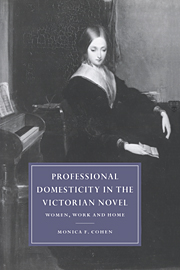Book contents
- Frontmatter
- Contents
- Acknowledgments
- Introduction
- 1 Persuading the navy home: Austen and professional domesticism
- 2 Homesick: the domestic interiors of Villette
- 3 Dickens I: Great Expectations and vocational domesticity
- 4 Dickens II: Little Dorrit in a home: institutionalization and form
- 5 Professing renunciation: domesticity in Felix Holt
- 6 A prejudice for milk: professionalism, nationalism and domesticism in Daniel Deronda
- Afterword
- Notes
- Selected bibliography
- Index
- CAMBRIDGE STUDIES IN NINETEENTH-CENTURY LITERATURE AND CULTURE
1 - Persuading the navy home: Austen and professional domesticism
Published online by Cambridge University Press: 10 November 2009
- Frontmatter
- Contents
- Acknowledgments
- Introduction
- 1 Persuading the navy home: Austen and professional domesticism
- 2 Homesick: the domestic interiors of Villette
- 3 Dickens I: Great Expectations and vocational domesticity
- 4 Dickens II: Little Dorrit in a home: institutionalization and form
- 5 Professing renunciation: domesticity in Felix Holt
- 6 A prejudice for milk: professionalism, nationalism and domesticism in Daniel Deronda
- Afterword
- Notes
- Selected bibliography
- Index
- CAMBRIDGE STUDIES IN NINETEENTH-CENTURY LITERATURE AND CULTURE
Summary
In 1839, Sarah Ellis prefaced her lengthy meditation on Victorian domesticity and the condition of English women by pronouncing a truly oceanic sentence:
it seems an ungracious task to attempt to rouse [English young ladies] from their summer dreams; and were it not that wintry days will come, and the surface of life be ruffled, and the mariner, even she who steers the smallest bark, be put upon the inquiry for what port she is really bound – were it not that the cry of utter helplessness is of no avail in rescuing from the waters of affliction, and the plea of ignorance unheard upon the far-extending and deep ocean of experience, and the question of accountability perpetually sounding, like the billows of this lower world – I would be the last to call the dreamer back to a consciousness of present things.
In a periodic sentence that culminates in shameless paralepsis, the call to duty is deferred by waves of clauses – parentheticals, modifiers and participles – that wash English, and presumably female, readers away from the national shore of those “present things” that Ellis will later tell us consist of the economic hardships endemic to British capitalism. Yet even at sea in the billows of this extended metaphor, we cannot but notice that it is a she at the helm, a she who steers. If we convert the metaphor's equivalencies, it is hardly remarkable to see a woman presented at the head of her household, in charge of her own sphere.
- Type
- Chapter
- Information
- Professional Domesticity in the Victorian NovelWomen, Work and Home, pp. 12 - 43Publisher: Cambridge University PressPrint publication year: 1998



